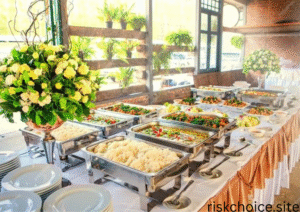
Managing a catering company presents opportunity, excitement, and gratification. Your objective is always to provide outstanding service and great cuisine whether you are catering private parties, business events, or weddings. But among the chaos of running events, customers, and workers, one crucial consideration is sometimes missed: catering business insurance.
Insurance for catering companies has grown increasingly vital in 2025 than it has ever been. Having the correct insurance coverage can make all the difference between a profitable company and a financial catastrophe given growing client expectations, stricter health rules, and more liability concerns.
Everything you need to know about catering business insurance—including the kinds of coverage you require, the typical rates, and advice on selecting the appropriate policy to safeguard your company—will be broken out in this page.
The Value of Catering Business Insurance
Imagine serving meals at a well-publicized gathering when a guest gets food sickness. Alternatively, suppose your catering van gets in an accident while on route delivering an order. These are actual events many caterers have encountered, not simply “what ifs.”
Such events can cost tens of thousands of dollars in legal fees, settlements, or equipment replacement without appropriate insurance. In some places, catering business insurance is not only a legal requirement—it’s a necessary safety net.
Cover of Catering Business Insurance:
Depending on the size and style of your catering business, the best catering insurance packages combine multiple kinds of coverage. The most often occurring types of coverage are as follows:
1. General Liability Insurance
The foundation of your insurance program is this. Should someone get hurt or property damage results from your services, it shields your company. As one illustration:
During your event setup, a customer trips on a damp floor.
You unintentionally pour soup on some pricey furniture for a client.
Why it matters: Medical and legal expenses can be financially catastrophic. This coverage guarantees you defence against outside claims.
2. Coverage for Product Liability Insurance
Being a caterer deals with food, your main offering. Product liability insurance will assist cover medical costs and legal claims should someone become unwell after eating your food.
For instance, a diner experiences a severe allergic response when a dish is wrongly labelled.
3. commercial vehicle insurance
Commercial auto insurance is required whether you use a car to carry meals, supplies, or personnel. Personal auto policies exclude occurrences involving businesses.
For instance, the food gets damaged when your delivery truck is rear-ended on route to an event.
4. Compensation for Workers’ Errors Insurance
Most states want this coverage whether you have delivery workers, waitresses, or chefs. Should an employee suffer an injury on the job, it compensates missed pay and medical expenditures.
For instance, a cook burns in the kitchen working on food.
5. Real Estate Insurance
This covers damage or loss to office space, cooking appliances, and commercial kitchens as well as business property.
For instance, a fire in your rental kitchen ruins equipment at $20,000.
Six: Insurance for Business Interruption
Businesses in catering depend on their being transportable and operational. Should a fire, flood, or epidemic keep you from working, this insurance pays operating expenses and lost income.
For instance, a power outage results in a significant cancellation of events, therefore costing income.
7. Breakdown of Equipment Insurance
Your company depends on ovens, freezers, and food trucks among other catering tools. Should any of these break down unannounced, this policy covers replacement or repair expenses.
Extra optional coverage
Your catering specialisation and size will determine whether you additionally wish to take consideration:
Liquor Liability Insurance: Should you be serving alcohol at a function.
Cyber Liability Insurance: Should you collect online payments or save client information?

Inland marine insurance covers equipment damage during transit.
Is legally required catering insurance?
Although not usually legally mandated, many forms of insurance are often required:
Most states mandate workers’ compensation if you have employees.
Using vehicles for business calls for commercial auto insurance.
Before employing your services, venues and clients may need proof of general liability insurance.
Not being insured could mean losing contracts, running afoul of the law, or being held personally accountable for losses.
By 2025, how much will catering business insurance cost?
Insurance prices change depending on several elements:
Revenue and business size
Employee count
Kind of services (food trucks, weddings, business gatherings)
Location:
Claim past:
By 2025, these are typical monthly expenses:
Kind of Insurance Average Monthly Cost
Common Liability $40–$80$
Product Legal Responsibility 25–50
Commercial Auto: $100 to $200 Workers’ Compensation Between $70 and $150 Property Insurance $30–$100
Business Interruption Between $50 and $100 Equipment Breakdown $20–$60
Business Owner’s Policies (BOPs) or bundled offers can assist cut total expenses.
Advice on Selecting Correct Insurance for Your Catering Company
1. Evaluate Your Safety Concerns.
Jot down the possible hazards your catering company runs across. Consider your events, how you set up your kitchen, your personnel, and your travel schedule.
2. Deal with a specialised insurance agent.
Search for brokers or agents focused on food service or hotel companies. They can identify custom policies and will be aware of the particular requirements of catering events.
3. Examine Many Quotes
Don’t fix on the first policy you come upon. To make sure you are obtaining the finest coverage at the best price, compare at least three to five quotations.
Check the fine print for exclusions. Policies might not cover outdoor activities, damage in transport, or food spoiling.
5. Maintain Update of Your Policy
Your policy will have to be changed as your company expands—more customers, new cars, new tools—to keep covered.
Top Insurance Companies for 2025 Catering Businesses
Among the most reliable companies in catering business insurance are:
Her Cox
NEXT Property Insurance
Thumbs
Gradual Business
State Farm
the Hartford
Each provides tailored policies for food service-related small companies.
Real-Life Example: How Insurance Saved a Caterer?
A little Texas catering business booked a big wedding for 2024. Sadly, a malfunctioning gas line produced a fire that destroyed property at the site and caused guest injuries. Without general liability and damage coverage, the company would have had lawsuits and repair expenses running over $100,000.
Their firm ran with little disruption and they only paid a nominal deductible thanks to their thorough insurance program.
Q1: Can I acquire temporary coverage for one catering event?
Indeed, Thimble and other suppliers have temporary catering insurance ideal for one-time events.
Q2: Does a home-based catering company fall under coverage of homeowners insurance?
Not sure. Usually excluding business-related claims, standard homeowners insurance Either separate business policies or a commercial rider will be required.
Q3: When will I be covered?
Certain companies provide instant coverage together with evidence of insurance right the same day.
Last thoughts
Not only is catering business insurance a wise financial decision, but it also protects your livelihood. Clients of 2025 want professionalism, and part of that is proving you’re protected for all scenarios.
Investing in the correct insurance policy will help you develop with confidence, secure your assets, and provide piece of mind whether your catering company is just starting or scaling.
Investigate, probe, and make sure your company has the coverage it deserves. You do, after all, concentrate on feeding others; let your insurance concentrate on safeguarding you.
